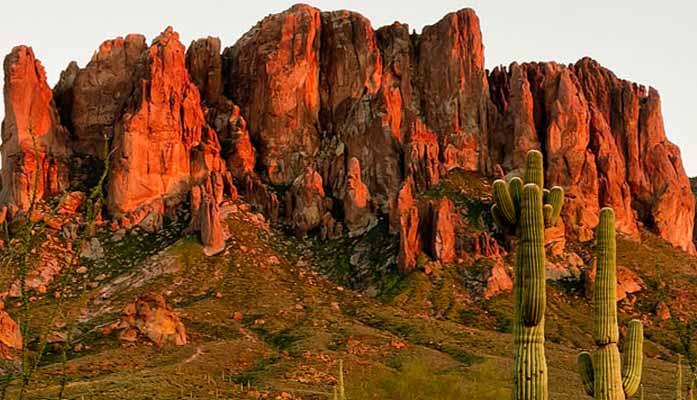
by Corinne Murdock | Oct 5, 2021 | News
By Corinne Murdock |
Most school districts have decided to saddle their local communities with a near-$100 million property tax increase, which will hit this month. In 2020, the Transpo Delta tax totaled just over $79 million; this year, it will be $178 million.
The law allows districts to raise local property taxes, called a “Transpo Delta” tax, to make up the difference between their current transportation funding determined by the Transportation Support Level (TSL) formula and the highest amount of transportation funding they’ve received historically, or the Transportation Revenue Control Limit (TRCL). Transportation funding is based on the amount of route-miles driven. Essentially, the Transpo Delta tax is TRCL minus TSL.
As Arizona Tax Research Association (ATRA) researcher Sean McCarthy explained, this latest Transpo Delta tax won’t hit communities equally.
“Some districts have almost no Transpo Delta tax because their route-mile driven formula in TSL is close to their TRCL,” assessed McCarthy. “Some have massive amounts, meaning they essentially get more funding than others in relative terms. Districts with lower property value incur abusive tax rates to pay for the Transpo Delta in some cases.”
School districts didn’t have to impose this burden on taxpayers. Districts had the option of tapping into $3.7 billion in federal COVID-19 relief funds.
“The one-time decrease in formula monies for transportation is a perfect example of what federal dollars should backfill. It’s not as though this $3.7 billion can be used for permanent pay raises for employees – it’s one-time money,” stated McCarthy. “For most districts, their one-time decrease in formula transportation funding represents a tiny fraction of the federal monies they received.”
According to ATRA, Tucson Unified School District increased taxes by $10.4 million, yet received just under $270 million in federal relief; Alhambra Elementary School District increased taxes by over $1 million, yet received over $93 million in federal relief; and Paradise Valley Unified School District increased taxes by over $4 million and received $64.5 million in federal relief.
Those districts who chose not to increase taxes are Santa Cruz Valley Unified School District, Alpine Elementary School District, Palominas Elementary School District, and San Fernando Elementary School District.
Corinne Murdock is a reporter for AZ Free News. Follow her latest on Twitter, or email tips to corinne@azfreenews.com.

by AZ Free News | Oct 4, 2021 | News
By AZ Free News |
Credit unions in Arizona have joined the Arizona Treasurer’s Office in opposition to a proposal requiring financial institutions to give the Internal Revenue Service (IRS) citizens’ personal account information if the account exceeds $600 of deposits or withdrawals. In a letter, they urged Senator Kyrsten Sinema and Senator Mark Kelly to oppose this measure being considered in Congress as part of the $3.5 trillion budget reconciliation bill. This proposal would threaten the financial security of more than 100 million Americans from all demographics.
“Being forced to hand over your personal household or small business financial records to the government as a law-abiding citizen is as intrusive as it gets. There are no guardrails in the bill for how the government can leverage this highly private information,” said Arizona Treasurer Kimberly Yee. “As Arizona’s Chief Banking and Investment Officer, I cannot stay silent while Arizonan’s sensitive financial data is at risk of unprecedented government surveillance.”
“There is simply no scenario in which this is a good idea for credit union members, or customers at any financial institution for that matter,” said Scott Earl, President and CEO of Mountain West Credit Union Association. “Between the exposure risk of data privacy, and the
significant resources and associated costs that would need be required to comply with this measure, it is a bad idea all around.”
The letter states, “As State Treasurer and credit unions in Arizona, we join with the many voices and groups from across the nation who strongly oppose this intrusive proposal.
Congress should not approve the IRS to have access to law-abiding Arizonan’s personal financial transactions in a blatant attempt to tax them unnecessarily.”

by Terri Jo Neff | Oct 2, 2021 | News
By Terri Jo Neff |
While COVID-19 damaged much of the state’s tourism for most of 2020, the Arizona State Parks and Trails still managed to pump $272 million into the state and local economies during Fiscal Year 2020, according to a report released last week by Gov. Doug Ducey’s office.
“Arizona’s state parks are second to none! In addition to their unbeatable views, recreational activities and family-friendly opportunities, they have a significant impact on our state economy,” Ducey tweeted on Sept. 30.
The 82-page report about the economic contributions and impacts of the state’s 21 parks, 10 historic parks, and 3 natural areas covers Oct. 1, 2019 through Sept. 30, 2020. The data comes from the Arizona State Parks and Trails in collaboration with the Regional Economic Analysis Program at the University of Arizona and the Hospitality Research & Resource Center at Northern Arizona University.
The economic contribution of spending by nearly 3,000,000 visitors in and around Arizona’s 34 state park properties was $449 million, including multiplier effects. Of that, $272 million was counted toward Arizona’s gross state product, supporting 4,173 jobs statewide.
Included in the report are details about how Arizona State Parks impacts the 13 counties home to at least one state park. Yavapai County has seven state parks -the most in Arizona- while Pinal and Santa Cruz each have four. Greenlee and Maricopa are the only counties with none.
According to the report, most state parks stayed open during the pandemic, but temporary closures were implemented at Kartchner Caverns and the 10 historic state parks as a safety precaution. The closures caused visits at those locations to plummet 50 percent from FY2019, but combined visitors to the other state parks resulted in a net one percent increase compared to 2019.
Lake Havasu State Park in Mohave County counted the most visits at 533,757 in FY2020. In fact, the report found the top five most visited parks accounted for 53 percent of the total statewide total.
Visitor counts at Kartchner Caverns State Park and the Tombstone Courthouse State Historic Park, the two state parks in Cochise County, took especially harsh hits during FY2020 due to mandated temporary closures. The parks saw a combined 161,010 visitors, down significantly from the nearly 220,000 visitors the year before.
When averaged out, the visitor count across the system declined 7.6 percent. The majority of the visits occurred in the first six months of the fiscal year before COVID-19 shutdowns occurred across the United States.
As part of the state’s post-pandemic recovery efforts, Ducey has focused on promoting the benefits of Arizona’s park system for its relatively safe and inexpensive outdoor options.
The report released by the governor’s office also highlighted the growth in popularity of Arizona State Parks from FY2014 when 2,310,349 visitors were counted, to 2,971,844 visitors in FY2020. And the spending by non-local visitors during that same period increased by 20 percent.
Several changes were made to park operations over those years. For instance, Lyman Lakes State Park in Apache County went from seasonally hours to being opened year-round, and Oracle State Park in Pinal County went from weekends-only hours to being opened seven days a week.
In July, Ducey announced $20 million in American Rescue Plan federal funding was being earmarked for capital improvements at various parks. Another $5 million will be spent with the State Parks Heritage Fund for new open space development, restoration or renovation projects, historic preservation, and outdoor education program.

by AZ Free Enterprise Club | Oct 2, 2021 | Opinion
By the AZ Free Enterprise Club |
Easy to vote and hard to cheat. That should be the benchmark for every single election we have.
Voters should not have to choose between having a secure election or having an accessible election. They can have both. And in Arizona, we’ve certainly made our elections accessible.
But that hasn’t always been the case with the security of our elections. And the results of the Arizona audit issued in September show just that.
These are significant issues that need to be addressed. Thankfully, the audit report made multiple recommendations that are common-sense election integrity policies.
And the most important one is something we’ve been saying for years…
>>>READ MORE >>>

by Corinne Murdock | Oct 2, 2021 | Education, News
By Corinne Murdock |
2021 marks the ten-year anniversary of education savings accounts (ESAs) in Arizona. The state’s ESA policy, formally known as Empowerment Scholarship Accounts, was established in 2011. As of this year, nearly a quarter of Arizona children are eligible for an ESA. The legislature has consistently fought to increase that rate – especially during this past legislative session.
The push for ESAs began with the Goldwater Institute. Their efforts led to the passage of SB1553, the first ESA policy in Arizona history. In a report, the Goldwater Institute highlighted three major factors that contributed to the ESA program’s success. The increasing demand for ESAs, financial benefits, and continued improvements all reportedly allowed the ESA program to grow.
Not only has the ESA program grown – supplemental resources have grown, too. The Goldwater Institute partnered with EdChoice to produce an interactive map to allow families to navigate their educational options. The map informs parents of state and local eligibility zones, the grade awarded each public school, and private school options. It also offers the location, contact information, grade range, tuition and fees for private schools.
The Goldwater Institute and EdChoice also released an informational packet discussing the track record, controversies, and details of the ESA program.
The ESA program has received significant pushback over the years. Activist groups like Save Our Schools Arizona (SOSA) view the ESA program as a drain on public school funding, which they claim is especially harmful for low-income families and in rural areas that already struggle with low funding.
However, research shows that per-pupil funding has increased by over $1,600 since the ESA program was put in place. This information was collected from reports by the Joint Legislative Budget Committee and the Arizona Department of Education (ADE).
In 2018, voters were presented with the option to expand ESAs as legislated in SB1431 with a ballot initiative, Proposition 305. It was the biggest move to expand the ESA program: if passed, all students would be eligible for ESAs. Over 64 percent of Arizonans voted against it.
Legislators attempted to pass SB1452 this year, which would’ve opened up ESAs to low-income families – but it stalled in the House after Senate passage. The House later shot down a budget provision attempting to revive the bill. Three Republican Representatives joined their Democratic colleagues to kill it: Michelle Udall (R-Mesa), Joel John (R-Buckeye), and Joanne Osborne (R-Goodyear).
This past year, the legislature passed laws enhancing the ESA program.
These laws reduced the waiting period for ESA applicants, dropped a punitive measure forcing parents to effectively pay twice for unapproved items, rescinded the ADE’s authority to prematurely enact punitive measures against parents, allowed online attendance to count toward time spent in a public school, allowed families to supplement their insurance coverage for special needs therapies, and reduced the processing time for applicants from 45 to 30 days.
Corinne Murdock is a reporter for AZ Free News. Follow her latest on Twitter, or email tips to corinne@azfreenews.com.





